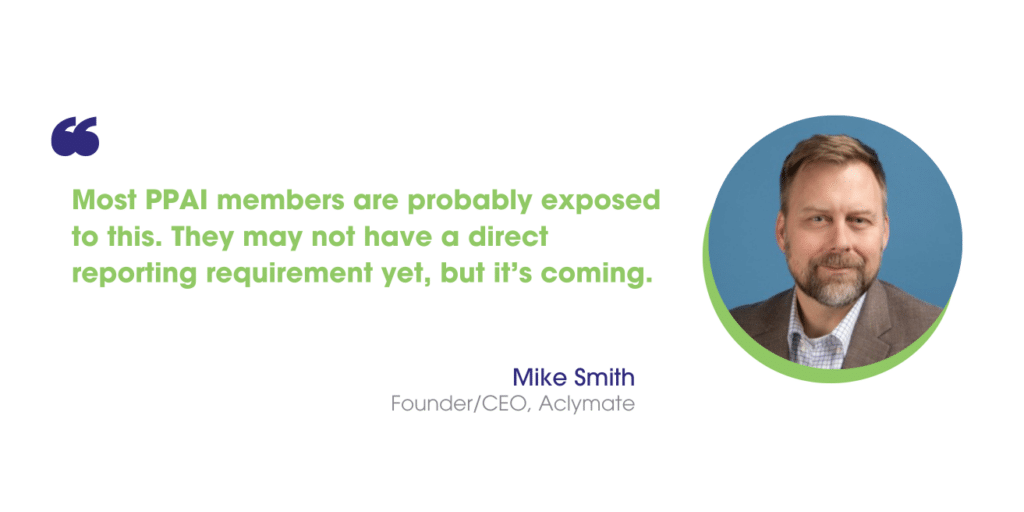California has passed two new laws that impose climate-related disclosure requirements, and even promotional products firms that don’t have a presence in the state may be affected.
Senate Bill 253
SB 253 – The Climate Corporate Data Accountability Act – requires U.S. companies with annual revenues exceeding $1 billion and doing business in California to disclose their Scope 1 and Scope 2 greenhouse gas emissions data starting in 2026 and their Scope 3 emissions data by 2027 (and annually thereafter).
- Scope 1: Direct emissions that occur from sources that are controlled or owned by an organization, such as a company’s machinery.
- Scope 2: Indirect emissions associated with the purchase of electricity, steam, heat or cooling.
- Scope 3: Emissions from upstream (what your product is made of and who you buy it from) and downstream (who uses your product and how it’s disposed of).
More than 5,000 companies are projected to be subject to SB 253, which levies penalties up to $500,000 per year for non-compliance.
- California – the world’s fifth largest economy by gross domestic product – is home to major global brands, such as Apple, Google, Gap, Chipotle and more.
Although only a handful of promo firms have annual revenues that exceed $1 billion, the law has far-reaching implications that the entire industry must be aware of, according to Mike Smith, founder and CEO of Aclymate (PPAI 833794, Standard-Base), a business services provider that measures, reduces, reports and offsets companies’ carbon footprint.
“Most companies doing a billion dollars in revenue probably have a footprint in California, and now they need to report their full carbon footprint, including Scope 3, meaning who they’re buying their things from,” Smith says.

“Most PPAI members are probably exposed to this. They may not have a direct reporting requirement yet, but it’s coming.”
Smith adds that major corporations already have similar requirements of partners in their supply chain in anticipation of regulatory reporting.
- For example, Disney and Amazon instruct suppliers to track, document and report their greenhouse gas emissions.
- Microsoft goes a step further, requiring suppliers to not only track their Scope 1, Scope 2 and Scope 3 emissions, but also reduce them by 55% by 2030.
First In The Nation
Although California is the first state to enact such legislation, the U.S. Securities and Exchange Commission (SEC) has announced similar climate reporting rules.
- In April, the SEC paused the implementation of the rules following several challenges in the U.S. Eighth Circuit Court of Appeals.
Contrasting with California’s law, the SEC’s rules require only public companies to publish their Scope 1 and Scope 2 emissions. Despite being included in an earlier version, Scope 3 reporting requirements are missing from the SEC’s final rules.
- California’s law is similar to the European Union’s Corporate Sustainability Reporting Directive (CSRD), which requires all companies with more than 250 employees and annual revenue of at least 40 million euros to report their Scope 1, Scope 2 and Scope 3 emissions.
Smith breaks down compliance with SB 253 into three steps: measure, reduce and offset.
“Measuring can take some time depending on how complex your operations are,” he says. “There’s no reason to wait, so don’t put it off. As you get closer to the deadline, there won’t be enough resources for companies struggling to comply.”
RELATED: Solutions Center: Sustainability
Once you measure your carbon footprint, you can get started on reducing it. Smith says there’s an advantage for those who move sooner rather than later because they’ll be able to tell their clients that they’re doing this work already.
“Your clients will know you’re a partner that can be trusted and thinks forward,” he says. “You’ll set yourself up to be in a much better position.”
Senate Bill 261
SB 261 – The Climate-Related Financial Risk Act – requires U.S.-based companies with total annual revenues exceeding $500 million and doing business in California to prepare and submit climate-related financial risk reports.
- Reports must be submitted by January 1, 2026, and biennially thereafter.
According to the law, the reports must be published on the company’s website and disclose the company’s climate-related financial risks, as well as any measures implemented to mitigate those risks.
RELATED: Carbon Dating: Your Emissions Relationship Doesn’t Have To Be Complicated
Climate-related financial risks include but aren’t limited to, “risks to corporate operations, provision of goods and services, supply chains, employee health and safety, capital and financial investments, institutional investments, financial standing of loan recipients and borrowers, shareholder value, consumer demand and financial markets and economic health.”
- If a company can’t provide all required disclosures in its report, it must submit a detailed explanation of any reporting gaps, describe the steps it’s taking to comply and provide complete disclosures in the future.
Approximately 10,000 companies are projected to be subject to SB 261, which levies penalties up to $50,000 per year for non-compliance.
Learn More At PPAI Product Responsibility Summit
Smith will be discussing these laws at PPAI’s Product Responsibility Summit from September 22-24.
To learn more or register for Product Responsibility Summit, click here.


